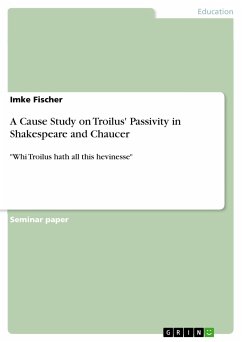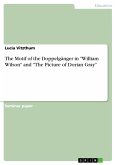Seminar paper from the year 2017 in the subject Didactics for the subject English - Literature, Works, grade: 1,0, University of Göttingen (Englisches Seminar), course: Shakespeare's Problem Plays, language: English, abstract: The story of Troilus, his love of Cressida and her betrayal of this love against the backdrop of the Trojan War is a European story, manifold told by many authors through the centuries. Troilus himself is a character from ancient times, first mentioned shortly in the Iliad, before Ovid picks up the theme in his Metamorphoses. The first version of the story as it is known today appears in the middle of the 12th century in Benoît de Sainte-Maure's "Roman de Troie". Giovanni Boccaccio's rewriting of the story in his "Il Filostrato" around 1340 increased its fame and had 'the father of English literature' Geoffrey Chaucer base his epic poem "Troilus and Criseyde" (1380s) thereon. Nowadays, we find ourselves thus confronted with a conglomerate of different aspects of the same story. The focus is sometimes set on the war themes, sometimes on the lovers, some authors target the love, some the betrayal. Contrary to other depictions, both in Chaucer and in Shakespeare Troilus himself is not a particular strong character. He displays a certain "hevinesse", a reluctance to move and act according to his dreams and wishes that makes him appear very passive compared to other main characters. Chaucer pioneered in this way of describing his hero and Shakespeare followed his lead, both in the individual portrayal and in the general structure of their works. While each representation in itself is unconventional, it also represents important themes of each authors' individual time and age. This paper sets out to analyze the origins of Troilus' display of passivity in love and war. Why are these two versions of Troilus so fundamentally different in their core when held against the example of earlier writers? And why do their heroes appear so weak and passive in their actions? Is this presentation a simple whim of Chaucer, repeated by Shakespeare, a plain weakness of character inane in their Troiluses or is there a method to his madness?
Dieser Download kann aus rechtlichen Gründen nur mit Rechnungsadresse in A, B, BG, CY, CZ, D, DK, EW, E, FIN, F, GR, HR, H, IRL, I, LT, L, LR, M, NL, PL, P, R, S, SLO, SK ausgeliefert werden.



